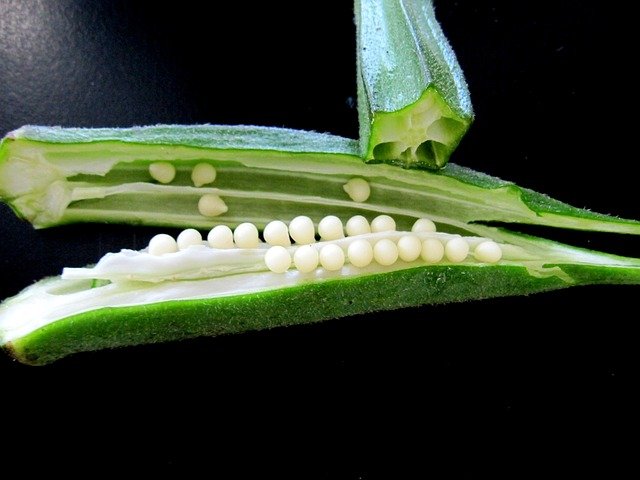
Okra Health Benefits
Nourishing Delight: Embracing the Health Benefits of Okra
Disclaimer: The information provided here is for general informational purposes only and should not be considered a substitute for professional medical advice, diagnosis, or treatment. Always seek the advice of your physician or qualified healthcare provider with any questions you may have regarding a medical condition.
Unveiling the Health Benefits of Okra
Beyond its delightful taste and humble presentation, this vegetable offers many health benefits, making it a valuable addition to any wholesome diet. Let’s explore the remarkable advantages of this versatile vegetable.
Okra Health Benefits
Blood Sugar Management: This vegetable has been found to have properties that may help regulate blood sugar levels. Its fiber and mucilage content slows down the digestion and absorption of carbohydrates, resulting in a slower and more controlled release of glucose into the bloodstream. This can be particularly beneficial for individuals with diabetes or those aiming to manage their blood sugar levels.
Okra Health Benefits
Immune System Support: It contains various beneficial nutrients, including vitamin C and antioxidants, crucial in supporting a healthy immune system. Vitamin C strengthens immune defenses, while antioxidants help protect cells from damage caused by harmful free radicals. Including this vegetable in your diet can bolster your body’s natural defense mechanisms.
Okra Health Benefits
Bone Health Enhancement: It contains essential nutrients that promote bone health, including calcium, magnesium, and vitamin K. Calcium and magnesium are crucial for maintaining strong and healthy bones, while vitamin K is vital in bone mineralization and reducing the risk of fractures. Incorporating this vegetable into your diet can help support bone density and contribute to overall skeletal health.
Okra Health Benefits
Eye Health Support:
It contains various antioxidants, including beta-carotene, lutein, and zeaxanthin, which are beneficial for eye health. These antioxidants help protect the eyes from oxidative stress and potentially reduce the risk of age-related macular degeneration and cataracts. By including okra in your meals, you can provide your eyes with essential nutrients that support long-term visual health.
Perfect Methods to Cook Okra and Preserve Its Health Benefits
To maintain the health benefits of okra, it is best to prepare it in ways that preserve its nutritional value. Here are a few methods that can help maximize the health benefits while enjoying its delicious flavors:
- Steaming: Steaming okra is a popular and healthy cooking method. It helps retain the vegetable’s nutrients while maintaining its natural texture. To cook this vegetable, place it in a steamer basket over boiling water for about 5-7 minutes, or until it becomes tender. Steamed okra can be enjoyed as a side dish or added to salads and stir-fries.
- Roasting: Roasting this vegetable adds a delicious depth of flavor while retaining its nutritional content. Toss whole or sliced okra pods with olive oil, salt, and your choice of herbs or spices. Spread them on a baking sheet and roast them in the oven at around 425°F (220°C) for 15-20 minutes, or until they become tender and slightly crispy. Roasted okra makes a tasty and nutritious snack or can be served alongside main dishes.
- Stir-Frying: Stir-frying this vegetable with other vegetables and a minimal amount of oil can help retain its nutrients while enhancing its taste. Heat a small amount of oil in a pan or wok, add sliced okra and your choice of vegetables, and cook them quickly over high heat, stirring frequently. This cooking method helps preserve the crunchiness of okra while minimizing nutrient loss.
- Adding to Soups and Stews: It can be an excellent addition to soups and stews, contributing to their flavor and nutritional content. Add sliced okra to vegetable soups, gumbo, or curry dishes during the last few minutes of cooking. This allows this vegetable to cook gently and retain its texture while infusing the soup with nutrients.
Remember to avoid overcooking okra to prevent it from becoming slimy. Overcooking can also lead to nutrient loss. You can enjoy okra while maximizing its health benefits by choosing cooking methods that preserve natural textures and flavors. 
Sowing Seeds of Nourishment and Health Benefits: A Guide to Planting Okra
Growing this vegetable in your garden or pots can be a rewarding way to enjoy the health benefits of this versatile vegetable. Here’s a step-by-step guide on plant okra:
Choose the Right Variety: Select a variety that suits your climate and gardening space. Look for types that are known for their productivity and disease resistance. Popular varieties include Clemson Spineless, Emerald, and Annie Oakley.
Prepare the Soil: It thrives in well-draining soil rich in organic matter. To improve fertility, prepare the ground by removing weeds and incorporating compost or well-rotted manure. The pH level should ideally be around 6.0 to 6.8.
Start Seeds Indoors (Optional): If you have a short growing season or live in a cooler climate, you can start seeds indoors 4-6 weeks before the last frost date. Plant the seeds in seedling trays or pots filled with seed-starting mix, keeping them moist and warm. Transplant the seedlings outdoors once the danger of frost has passed.

Okra Health Benefits
Direct Sowing: You can sow seeds directly into the garden soil in areas with a longer growing season or warmer climates. Wait until the soil has warmed up and the temperatures consistently reach around 65°F (18°C). Space the seeds about 12-18 inches apart in rows 3-4 feet apart.
Planting Depth and Care: Plant the seeds at a depth of approximately 1 inch. Water the soil gently to keep it moist but not waterlogged. As the plants grow, thin them out if necessary, leaving the strongest ones to reach their full potential. Mulch around the base of the plants to conserve moisture and suppress weeds.
Provide Sunlight and Water: Okra requires full sun exposure, so ensure that the plants receive at least 6-8 hours of direct sunlight per day. Water the plants regularly, keeping the soil consistently moist but not overly saturated. Deep watering once or twice a week is usually sufficient depending on your climate and rainfall. 
Okra Health Benefits
Support and Pruning: This plants can grow quite tall, so it is beneficial to provide support, such as stakes or trellises, to keep the plants upright. This helps prevent them from toppling over during heavy winds or when laden with mature pods. Prune any damaged or diseased leaves to maintain plant health and air circulation.
Harvesting: Okra pods are ready for harvest when they reach around 2-4 inches long and are still tender. Harvest the pods every 2-3 days to encourage continued production. Use a sharp knife or pruning shears to cut the pods from the plant, being careful not to damage the main stem or nearby pods. Following these steps and providing proper care, you can grow your fresh and nutritious okra, ensuring a steady supply of this healthy vegetable right from your garden or pots.

Preserving Freshness and Health Benefits: Effective Storage Methods for Okra
Proper storage is essential to retain the nutrients and health benefits of okra. Here are some tips to help you store okra effectively:
Fresh Okra Storage:
-
- Refrigeration: Place fresh okra pods in a perforated plastic bag or a paper towel-lined container. Store them in the vegetable crisper drawer of your refrigerator. It can stay fresh for 3-4 days when stored this way.
- Avoid moisture: Ensure that the is dry before storing it. Excess moisture can promote spoilage and reduce its shelf life.
Freezing :
-
- Blanching: If you have an abundance of this vegetable, blanching, and freezing are excellent ways to preserve their nutrients. Blanch the whole pods in boiling water for 2-3 minutes, then transfer them to an ice bath to cool. Drain well, and pat dry before freezing.
- Freezing: Place the okra pods in airtight freezer bags or containers once blanched and dried. Label them with the date and store them in the freezer. Frozen okra can retain its quality for up to 8-12 months.
- Note: Frozen okra works well in cooked dishes, but the texture may change, becoming slightly softer. It is best used in soups, stews, and stir-fries rather than dishes that require a crisp texture.
Avoid Overripe Okra:
-
- Monitor ripeness: The pods should be harvested when tender and still relatively young. Overripe or excessively mature pods can become tough and fibrous, which may diminish their taste and texture.
- Regular harvesting: Regularly harvest okra pods when they reach the desired size to prevent them from becoming overripe. This encourages the plant to continue producing fresh and tender pods.
By following these storage guidelines, you can maximize the retention of nutrients and health benefits of okra, ensuring that you can enjoy its goodness for extended periods and have a readily available supply of this nutritious vegetable.

Okra Health Benefits
References
- Elkhalifa AEO, Alshammari E, Adnan M, Alcantara JC, Awadelkareem AM, Eltoum NE, Mehmood K, Panda BP, Ashraf SA. (Abelmoschus Esculentus) as a Potential Dietary Medicine with Nutraceutical Importance for Sustainable Health Applications. Molecules. 2021 Jan 28;26(3):696. doi: 10.3390/molecules26030696
- Nkongho RN, Efouba-Mbong JT, Ndam LM, Ketchem GA, Etchu-Takang EG, Agbor DT. Seed production system and adaptability of Abelmoschus esculentus L.) cultivars in Buea, Cameroon. PLoS One. 2022 Dec 14;17(12):e0278771. oi: 10.1371/journal.pone.0278771
- Durazzo A, Lucarini M, Novellino E, Souto EB, Daliu P, Santini A. Abelmoschus esculentus (L.): Bioactive Components’ Beneficial Properties-Focused on Antidiabetic Role-For Sustainable Health Applications. Molecules. 2018 Dec 21;24(1):38. doi: 10.3390/molecules24010038
- Dantas TL, Alonso Buriti FC, Florentino ER. (Abelmoschus esculentus L.) as a Potential Functional Food Source of Mucilage and Bioactive Compounds with Technological Applications and Health Benefits. Plants (Basel). 2021 Aug 16;10(8):1683. doi: 10.3390/plants10081683

Okra Health Benefits
More Stories
- Travelers Palm | Plant Care | Guide
- Philodendron Black Cardinal Care | Plant Guide
- Philodendron Selloum [ Philodendron Bipinnatifidum ] Plant Guide
- Fiddle Leaf Fig Tree | Ficus Lyrata | Popular Varieties + Care
- Healthy Fruits in the PhilippinesBenefits of Dandelions
- Anti-Aging Foods | Fruits and Vegetables
- Oregano: A Powerful Herb in Your Kitchen | Health Benefits
- Rose and Its BenefitsBromeliad Care | Plant Guide
- Aloe Vera Benefits: Soothing Secret for Health and Wellness
- Dragon Fruit Health Benefits [ Pitaya/Pitahaya ]: The Exotic Superfood
- Grapes Health Benefits | Growing and Creative Ways to Serve
- Mushrooms Health Benefits | Supporting Local Farmers
- Lychee Health Benefits, Culinary Delights, and Propagation
- Ginger Health Benefits: Unearthing the Healing Powers
- Onions Health Benefits: A Personal Journey of a Backyard Gardener
- Turmeric Health Benefits: Unveiling The Golden Wonders
- Okra Health Benefits

